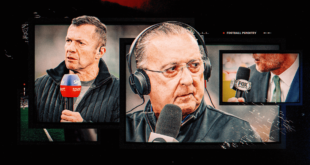The question came 20 minutes into Mauricio Pochettino’s introductory press conference as U.S. men’s national team coach; the first query of the event in his native Spanish.
“It’ll give me a break,” Pochettino joked at the chance to rest his English.
“What was the challenge that made you want to take the U.S. job?” the journalist asked.
The question got to the root of an issue that hovered over the entire event at a glitzy high rise in New York City’s Hudson Yards development. Why would a manager with such a massive reputation see this as his next step?
The 52-year-old former Tottenham, Paris Saint-Germain and Chelsea manager spoke first about the feeling he had meeting with U.S. Soccer executives, and then about the great potential of the sport in the U.S. Then he got to the task at hand: taking the USMNT to a different level.
“It’s a challenge that takes us out of our comfort zone,” Pochettino said in Spanish, smiling. “For us, the easy thing to do is take on things we already know, and we already have a quick vision and an idea (of how to accomplish it). But here it is about taking on something one does not know as well; getting out of your comfort zone so that you can challenge yourself.
“It is not only about a challenge to achieve things together but also about challenging yourself.”

CEO of U.S. Soccer JT Batson, technical director Matt Crocker, Pochettino and president Cindy Parlow (Luke Hales/USSF/Getty Images for USSF)
Whether knowingly or not, Pochettino put himself on a parallel path with his new team. For several cycles, the idea of “getting out of your comfort zone to grow” has been a part of the USMNT’s journey toward improvement. The idea dates back to Jurgen Klinsmann’s era, but it was also discussed often by former coach Gregg Berhalter.
But the idea is about more than just going to Europe to play for the biggest clubs. It is about understanding how to find the right challenges that force you to grow. To get better.
That Pochettino sees this job as a challenge for his own growth was, perhaps, the most important takeaway from Friday’s press conference. The U.S. needed a new voice to push them to take that next step, beyond potential and into results. They will now begin that journey with a coach who has a bigger reputation than anyone else in the room but who is seeking that same type of growth.
Pochettino came across as charming, excited and motivated in the press conference. He spoke about how happy he was to be with the U.S., about the honor of being the first Spanish-speaking Latin American coach in the history of the program, and of his connection with U.S. women’s coach Emma Hayes and the potential influence the winning history of the USWNT can have on the men’s program.
He told a story about learning the English-language term of being “over the moon” in his early days as manager of Southampton in the Premier League and said he and his family are over the moon that he has taken this new job.
That he switched back and forth between English and Spanish was, in itself, a historic moment and representative of how this hire creates an unprecedented opportunity for U.S. Soccer to reach this country’s massive — and growing — Latino population.
Pochettino clearly understood, though, that reaching fans, both new and old, will come down to one thing: winning.

Pochettino is presented to the media at Hudson Yards (Luke Hales/USSF/Getty Images for USSF)
Several times over the course of the morning, Pochettino returned to a simple idea that he thinks can push this team forward: belief. He said the word “believe” a dozen times over the course of the hour-long event. For a coach famous for his ability to inspire a dressing room, it hinted at the way he’ll target mentality and psychology as much as he will tactics.
“’Believe’ for me is a word that is a powerful word,” Pochettino said. “You can have enormous talent and you can be clever, but in football, you need to believe. Believe that all is possible. If we find a way to believe all together, then for sure we will achieve.”
Later, he reinforced that idea with his sights set on the World Cup tournament the U.S. will co-host with Mexico and Canada in two years’ time.
“We need to really believe in big things,” Pochettino said. “Believe that we can win not only a game, we can win the World Cup. … We want players that show up, day one at the training camp, and think big. That is the only way to create this philosophy or this idea all together to perform and to put your talent in the service of the team. That is going to be our massive challenge.”
Bringing that belief back will be first on his to-do list as the USMNT coach.
The U.S. was clearly lacking confidence in the September window, something Pochettino said was understandable considering the results in the Copa América. The performances in a loss to Canada and a draw with New Zealand only magnified the issues within the group. Pochettino, though, didn’t seem overly concerned with the overall culture of the group, alluding then to the idea of tapping into the “winning mentality” that permeates American sports and taking inspiration from the winning culture the U.S. women have long demonstrated.
“We are here because we want to win,” Pochettino said.

The video board announces Pochettino’s appointment at the friendly against New Zealand in Cincinnati (John Dorton/ISI Photos/USSF/Getty Images)
There were, of course, ideas about how to play discussed as well.
“We are in the USA,” Pochettino said. “I think to convince our fans, this is about to attract (them), and the aesthetic is really important. We want to play nice football, good football, exciting football, attacking football. And then, of course, we want to have the possession, because we are coaching staff also with a philosophy to have the ball. We need to run, we need to move, we need to give options, good angles to your team-mate. … And then when we don’t have the ball we need to run, we need to be aggressive, we need to be competitive.
“The potential is there. The talent is there. It’s only to create the best platform for them to express themselves.”
While Pochettino acknowledged that those are the trademarks of his team, he also said he wants first to get a feel for his players before he declares how this U.S. team will play.
That process will start in the coming days, as Pochettino inevitably goes to sit and meet with members of the player pool, chief among them star winger Christian Pulisic. Pochettino said he wants to hear from members of the team individually, to get feedback on how they see things. Then he will gather the group together for the first time next month for friendlies in Austin, Texas and Guadalajara, Mexico.
The process to get a deal over the line has been a long one, stretching more than two months from the beginning of recruitment to his formal introduction. Pochettino admitted it was difficult to wait it out. He was ready to get to work.
Now, the clock has started. The U.S. has less than two years until the World Cup and a mountain to climb to be ready. They have a coach, though, that few would have imagined would take this group into that tournament.
A coach who now will try to inject belief into and around this team.

GO DEEPER
How USMNT landed Pochettino: Hayes’ role, Chelsea delays and Argentine steak
(Top photo: Luke Hales/USSF/Getty Images for USSF)
Source link
 meganwoolsey Home
meganwoolsey Home



